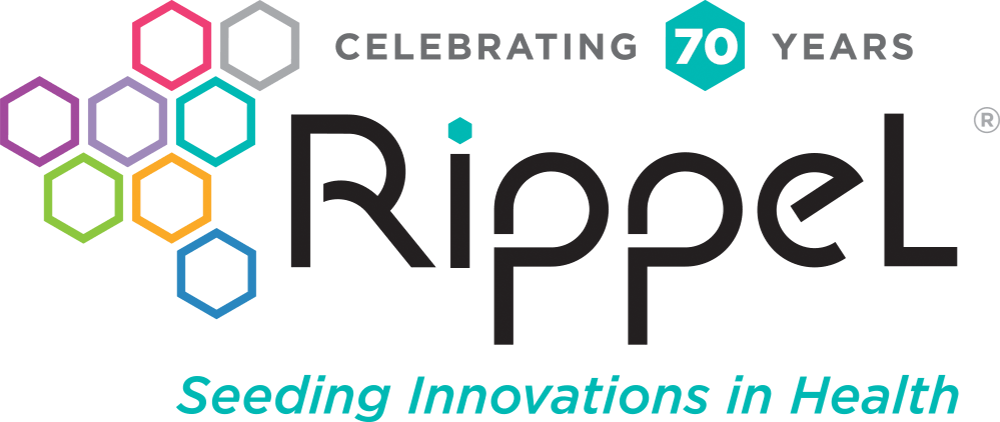Amplifying Stewardship Together

Tracking Poll for Stewards of Well-Being
Explore findings from our recently concluded bi-monthly poll that surfaced perspectives from a diverse circle of stewards about navigating system change during the COVID-19 pandemic.
There is a growing group of people and organizations who understand the need for action that is grounded in what we are calling stewardship—action that enables all people to prosper and reach their full potential. We call these people and organizations stewards.
Every steward has an area of focus as it relates to improving well-being. Each of us has carved out our role in these respective areas, making up part of an ecosystem. Rippel’s is health. Other stewards focus on democracy, equity, the environment, placemaking, the economy, education, or some combination.
We’ve done a lot of hard work, and we’ve had many breakthroughs. Yet despite our significant investments in time and money, we haven’t made enough progress
toward well-being in the United States. A lot of us have been reflecting and many are asking: what can we do differently?

Stewards are people or organizations that are developing their abilities to:
- Take responsibility for forming working relationships with others to transform well-being across a region.
- Serve as natural boundary spanners because they are informed by place-based, interdisciplinary, multisector, and multicultural perspectives.
- Understand that purpose must be larger than oneself and one’s organization, power must be built and distributed with others, and wealth must be invested to create long-term value as well as address short-term urgent needs.

The BIG Questions
How can we acknowledge our limitations, amplify our strengths, and expand our horizons?
Could we better achieve our goals if we work more cohesively and with a greater level of accountability to one another?
They open us up to other important questions, which we are also working to clarify through the project:
- How can we avoid pursuing narrow solutions when we know that barriers to well-being are complex and often can’t be “solved” by one sector or organization alone?
- How do we resist “quick fix” temptations when we know success depends on taking a long-term approach to problem-solving?
- How do we collaborate in ways that include all the people, organizations, and ideas that would strengthen our practice? In ways that recognize we can humbly learn from some marginalized cultures that have been encouraging us to work more cooperatively all along?
- How do we recognize one another’s strengths and see the potential of what we could do with greater alignment instead of magnifying our differences?
- How do we stop writing off those who might one day be effective stewards by wrongly assuming their intentions?
Amplifying Stewardship Together is about working as a group to openly learn from our independent and collective successes and failures, and seeing our differences as assets, so we can adapt our thinking and practices for a more inclusive, cohesive, and effective future. Because we work in such a complex and massive ecosystem that makes up well-being in the United States, we don’t assume it’s possible, or helpful, to create a giant infrastructure and set of processes to help us all work together. But we can lift up shared principles and practices to use as we each go about our own area of focus.
When we amplify these shared principles and practices in our daily work, we will naturally set the conditions that steward well-being across the country. Through this commitment we will create a shared identity and thus the opportunity to claim broader scope and power as part of a visible movement that is stewarding equitable ecosystems for well-being.
Getting Started
Who’s Involved
ReThink Health is working with leaders who act as stewards.
They are:
- A mix of local and national leaders
- Working in different domains affecting regional well-being: health, economy, environment, democracy, placemaking, education, and more
- Well-networked individuals working in well-networked organizations
- Successful for different reasons, so they can learn from one another’s strengths
- Diverse in race, ethnicity, gender, and age
Since our work is interdependent (whether or not we recognize it as such), we must show up in the world with greater context and understanding about what “stewardship” is today—who we are, what we are doing individually and together, what is at stake, and for whom.
Our activities in Amplifying Stewardship Together will focus on learning, adapting, and amplifying stewardship principles and practices so we can strengthen the foundation from which leaders can continue their efforts to steward well-being.
Learning
Our efforts must be grounded in reality (as opposed to our hunches) about what amplifies and weakens stewardship of well-being. We’ll conduct two nationwide studies to (1) examine long-term, nationwide trends that affect stewardship, and (2) learn the extent to which stewardship mindsets and practices have spread and are aligned in regions across the United States.
Adapting
We must adapt based on what we learn together. We’ll convene to deepen our stewardship practice by understanding and confronting the dominant patterns of thinking and sticky issues that hold us back in our efforts.
Amplifying
We must amplify stewardship principles and practices. Together we’ll shine a light on the broad scope of stewardship and the power we can have when each of us approaches our work with a shared set of principles and practices. We’ll share this common identity with other leaders—via their conferences, advisory groups, publications, and beyond—to invite them to work more cohesively and with greater levels of accountability to others who share their goals.
Meet Our Project Team

Jane Erickson

Bobby Milstein
Jane Erickson
“Rippel’s approach emphasizes practice transformation — shifting mindsets and actions — to fundamentally change how people and organizations work together through shared stewardship. When leaders begin to think and act differently, we start to see major shifts in organizational strategies, funding flows, policies, and lots of other important conditions that foster equitable, thriving communities.” — Jane Erickson, Director of Learning and Impact
Joined Rippel: 2013
Current Roles: Jane is the Director of Learning and Impact at The Rippel Foundation, where she leads Rippel’s work to measure, evaluate, and understand efforts for stewarding collaborative, equitable system change across the country. Jane and her team develop the frameworks, metrics, and approaches to surface and synthesize the effects of Rippel’s efforts and convey collective insights about what works, for whom, how, and under what contexts. The Learning and Impact team builds conditions that center learning and adaptation in all of Rippel’s work as an effective social change practice.
Career: A facilitator and pattern-spotter, Jane draws on rich experience in applied research, program design and implementation, and organizational strategy. She has led numerous nation-wide efforts to develop a shared understanding of the landscape of multisector collaboration to improve community health, including the ReThink Health Pulse Check survey. Jane has also designed and directed a range of nationally focused action-learning projects to build and spread practices for stewarding equitable system change, including ReThink Health Ventures (2016-2018) and Amplifying Stewardship Together (2019-2021). Previously, she oversaw the grants and contracts department at the Clinton Foundation’s Health Access Initiative. She began her career working to foster civic engagement across communities in the US and internationally, including as a Fulbright Scholar in Indonesia. In 2020, Jane was named a Terrance Keenan Institute fellow by Grantmakers in Health.
More about Jane: Jane loves to imagine alternative futures through world-building science fiction and high fantasy (novels, television, or movies!). A Colorado native, she now lives in Syracuse, NY with her partner and two busy toddlers, where she spends as much time outside as she can — no matter the weather.
Education: Syracuse University (MPA, MAIR, Certificate of Advanced Study in Public Health), Hobart and William Smith Colleges (BA)
Bobby Milstein
“ReThinking is the most practical thing any of us can do to change the future. It helps us see where we fit in a rapidly changing world and become better stewards of the systems that shape our lives together.” — Bobby Milstein, Director of System Strategy
Joined Rippel: 2011
Current Roles: Bobby directs system strategy for ReThink Health and Rippel; he is also a Visiting Scientist at the MIT Sloan School of Management. With an educational background that combines cultural anthropology, behavioral science, and systems science, he concentrates on efforts to spark large-scale institutional and cultural change. He works with innovators who see themselves — and others — as shared stewards in a movement for well-being and justice. In response to the compounding crises of 2020, Bobby was lead editor of “Thriving Together: A Springboard for Equitable Recovery and Resilience in Communities Across America.” He is a member of the National Academies Roundtable on Population Health Improvement, a co-founder of the Well Being in the Nation Network, an invited contributor to the Surgeon General’s Report on Community Health and Economic Prosperity, and a frequent design consultant for new endeavors that advance the dynamic and democratic frontiers of shared stewardship. Bobby also coordinates ongoing development of the ReThink Health Dynamics Model, the Thriving Together Theater, and other simulation tools that let leaders play out the consequences of their own scenarios for system change.
Career: Before joining ReThink Health and Rippel, Bobby spent 20 years planning and evaluating system-oriented initiatives at the Centers for Disease Control and Prevention (CDC), where he was the principal architect of CDC’s framework for program evaluation. He received CDC’s Honor Award for Excellence in Innovation, the Applications Award from the System Dynamics Society, the President’s Prize from the American Evaluation Association, and Article of the Year awards for papers published in Health Affairs and Health Promotion Practice.
More about Bobby: Bobby once was a documentary filmmaker whose work was used by PBS to spotlight challenges of racism on college campuses. He also contributed storylines for The West Wing on how to get beyond zero-sum thinking when setting health priorities.
Education: Union Institute and University (PhD), Emory University (MPH), University of Michigan (BA)
Resources
Stewardship and Public Service: A Discussion Paper
From the Field
03/31/1997
This discussion paper prepared for the Public Service Commission of Canada presents stewardship as a bridge between purely market-based approaches and broader public sector responsibilities. While market-based reforms have shown many possible outcomes, they are not robust enough to embrace the full range of public sector activities, such as governance and guarding the public interest.
The Concept of Stewardship in Health Policy
From the Field
01/01/2000
This World Health Organization Bulletin traces the history of stewardship and explores its potential as an avenue for public policy to effectively and efficiently improve health and well-being.
The World Health Report 2000: Health Systems: Improving Performance
From the Field
01/01/2000
This report from the World Health Organization dives deep into resource allocation and performance quality in the health care system circa the year 2000. It’s notable for its emphasis on stewardship as a critical part of improving that system.
Health Stewardship: The Responsible Path to a Healthier Nation
From the Field
01/01/2009
The Aspen Institute published this paper explaining the value of health stewardship and making a case for its importance for successfully navigating the challenges facing the system that produces health and well-being.
What Help is a Steward? Stewardship, Political Theory, and Public Health Law and Ethics
From the Field
12/20/2011
As part of The Northern Ireland Legal Quarterly journal’s special issue on ‘super-stewardship’ and the related work of Roger Brownsword, this paper critically examines stewardship in public health.
Achieving Accountability for Health and Health Care Minneapolis, MN
From the Field
11/01/2012
This article in Minnesota Medicine proposes Accountable Health Communities (AHCs) as a way to establish health system stewardship. They would to review local data against the Triple Aim, create shared goals and investments, and involve citizens in reform and stewardship.
Stewardship: Choosing Service Over Self-Interest
From the Field
01/01/2013
In this book, Peter Block asserts that a fundamental shift in how we distribute power, privilege, and the control of money—away from self-interest and toward stewardship—can transform every part of an organization for the better, and he examines the nitty-gritty of implementing these reforms.
An Introduction to Network Weaving
From the Field
06/01/2013
Building effective networks is one of the key tasks for a steward. This practical guide by June Holley teaches basic skills for doing just that.
The Three Horizons: The Patterning of Hope
From the Field
09/13/2013
Bill Sharpe wrote this introduction to the Three Horizon’s framework, which can offer stewards a way to manage innovation and transformational change along the short, medium, and long term.
Core Attributes of Stewardship; Foundation of Sound Health System
From the Field
03/01/2014
This International Journal of Health Policy and Management Perspective offers one way to look at stewardship, positing that it has five core attributes: responsible management, political will, a “normative dimension” (equity), balanced interventions, and components of good governance.
Promoting Population Health Through Financial Stewardship
From the Field
04/03/2014
This Perspective in the New England Journal of Medicine argues that physicians have an ethical responsibility to act as stewards to promote their patients’ health and well-being.
2016 Pulse Check Survey Findings
ReThink Health
03/15/2017
These results shaped the development of ReThink Health’s Pathway and Essential Practices by illuminating the characteristics of regional multisector partnerships. The survey explored the following questions: What is the nature of the work stewards do in these partnerships? How does stewards’ multisector partnership work develop over time? How do they advance their work? What barriers to advancement do they face? How do stewards finance their multisector partnership work?
Public Involvement and Health Research System Governance: a Qualitative Study
From the Field
08/30/2018
This article in Health Research Policy and Systems describes an exploratory, qualitative study of specific active stewardship efforts in two countries: England and Canada. It illustrates some of the benefits of stewardship while identifying three sets of common issues across both locations.
Regional Stewards: Nudging Systems Toward Health and Well-Being
Stacy Becker, Vice President, Programs
12/11/2018
Stewards can’t control outcomes in a complex adaptive system, but they can nudge them in the right direction. Using the ReThink Health Pathway, stewards can contribute to shifting mental models away from health care alone and toward the full range of factors that produce health and well-being.
World Health Organization: Stewardship Resources
From the Field
01/01/2019
The World Health Organization has collected resources related to stewardship, with an emphasis on the health care sector.
What Could Stewards Achieve if We Acknowledged our Limitations, Amplified our Strengths, and Expanded our Horizons?
Jane Erickson, Project Director
03/02/2020
Every steward has an area of focus as it relates to improving well-being. Each of us has carved out our role in these respective areas, making up part of an ecosystem. Rippel’s is health.
To Catalyze System Change, Become a Better Casemaker
Tiffany Manuel, President & CEO, The CaseMade and Bobby Milstein, Director, System Strategy
03/10/2020
Perhaps more than ever before in our nation’s history, there is an enormous opportunity to build the groundswell of support that we need to advance equitable system change and improve our collective well-being.
Stewards are Hopeful as the Case for Systems Change is Increasingly Seen and Understood
Jane Erickson, Project Director
06/10/2020
We are experiencing multiple systemic crises at once—including Covid-19, racially-motivated violence and injustice, and an economic recession—and one result is that more and more people see and understand that our lives and livelihoods depend on each other and on a system that is poorly designed for equitable outcomes.
Amplifying Stewardship: Characteristics and Trends Stewards Consider When Expanding Equitable Well-Being
ReThink Health
07/27/2020
This report profiles characteristics of people who are not only impressive stewards, but also are helping to grow the entire field of system stewardship for well-being. Read the Report
Stewards are Leveraging Relationships to Help Communities Thrive
Iueh Soh, Associate Director, Stewardship Practice and Jane Erickson, Project Director
08/03/2020
From city council chambers to neighborhood revitalization partnerships around the country, stewards are leveraging relationships to support their communities in the midst of the Covid-19 pandemic, ongoing protests against racial injustice, and economic recession.
In the Midst of National Crises, Stewards are Taking Action Inside Their Own Institutions
Iueh Soh, Associate Director, Stewardship Practice and Bobby Milstein, Director, System Strategy
09/28/2020
Our institutions are in transition. From hospitals navigating new financial realities during the pandemic to schools re-working their curricula, the established ways are changing. Across the country, stewards are taking advantage of these transitionary times and encouraging our institutions to also advance well-being and equity.
Insight Spotlight Series: Amplifying Stewardship Together Project
Jane Erickson, Project Director and Bobby Milstein, Director, System Strategy
11/23/2020
This month, ReThink Health is sharing what we are learning across our projects through an Insight Spotlight series. This week, the spotlight is on the Amplifying Stewardship Together (AST) project, which is clarifying stewardship mindsets and practices and helping them develop into widespread norms across the country.
Stewards Continue to Seek Lasting Systems Change
Iueh Soh, Associate Director, Stewardship Practice
12/15/2020
In a time fraught with ongoing national crises on multiple fronts, stewards are exhausted, but remain undaunted. Many see an opportunity to catalyze uncertainty into lasting systems ...
Stewards End the Year with Rising Determination to Make Progress on Systemic Issues
Bethlihem Gebremedhin, Program Coordinator and Iueh Soh, Associate Director, Stewardship Practice
02/24/2021
Fatigue. Optimism. Frustration. Persistence. These are the varied emotions and mixed signals ReThink Health encountered in response to our December Tracking Poll for Stewards of Well-Being. This was our final bi-monthly survey, which was designed to find out how stewards are navigating systems change in the midst of Covid-19, racial injustice, economic recession, divisive electoral politics, and ecological catastrophes. Read more about these findings in our latest blog post.
14 Maple Avenue Suite 200, Morristown, NJ 07960, USA
678 Massachusetts Ave, Suite 400, Cambridge, MA 02139, USA
Phone: 973.540.0101
Email: [email protected]




